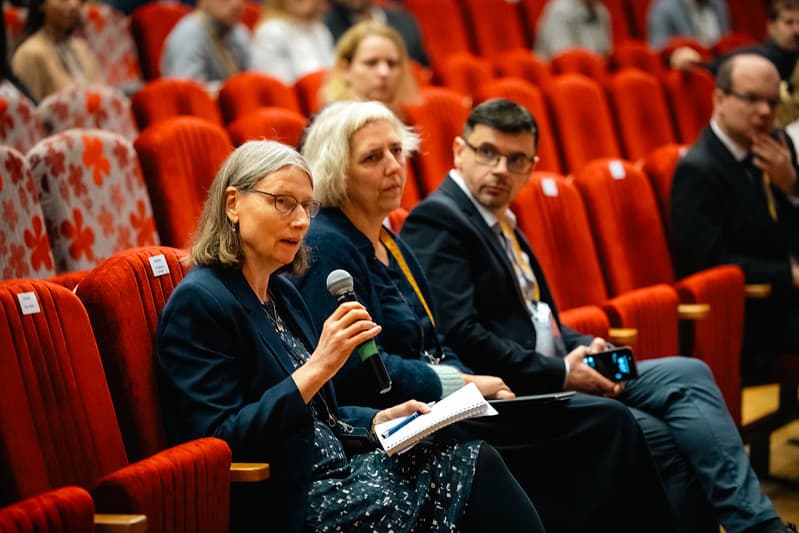We're loading the full news article for you. This includes the article content, images, author information, and related articles.
A Ukrainian combat medic who served in intense battles, Alina Sarnatska, 38, has rapidly emerged as a significant playwright, using theatre to confront the harsh realities of war and give voice to untold stories.

Eighteen months ago, Alina Sarnatska was a combat medic on Ukraine's frontline, including the fierce battle for Bakhmut, with little prior engagement in theatre. Today, she is an acclaimed playwright with several dramas to her name, her rapid transformation driven by the urgency of the ongoing conflict.
Sarnatska, 38, who previously enjoyed writing in her youth, now views her accelerated career as a direct response to the war. She expressed a profound sense of urgency, stating, “I think Russians will kill me, maybe after two years, maybe after three years, by drones, rockets or in the street. So I don’t have time. I need to do everything right now and right here.”
Sarnatska's journey into playwriting began through the 'Theatre of Veterans' programme, an initiative co-founded by dramatist Maksym Kurochkin, who himself served in Luhansk in 2022. The programme aims to empower soldiers and veterans to transform their battlefield experiences into theatrical works, offering a platform for authentic narratives.
The full-scale Russian invasion of Ukraine in February 2022 dramatically altered the lives of many civilians, with hundreds of thousands volunteering for the Ukrainian army. Sarnatska, a former researcher and political activist, joined the military in March 2022, serving as a combat medic for two and a half years. Her experience reflects a broader societal shift where ordinary citizens have taken up arms to defend their country.
While Ukraine has made strides in promoting gender equality, with legislation prohibiting discrimination, women in the military still face challenges. Historically, women's roles were often restricted to traditionally feminine positions like medics or cooks. Although restrictions on combat roles have expanded, discrimination persists in career progression and leadership opportunities. Issues such as ill-fitting uniforms and protective gear designed for men also highlight practical barriers for female soldiers.
Sarnatska was among 15 individuals selected for the 'Theatre of Veterans' scheme. Her debut play, 'Military Mama,' was highly regarded and premiered at Kyiv's Left Bank theatre. The play delves into the experiences of an ordinary woman in the army, addressing themes such as motherhood, sexism within the military, relationship breakdowns, mental health challenges, and desertion.
These themes, while not strictly taboo, are often absent from official narratives, making Sarnatska's work a crucial contribution to understanding the human cost of war. Testimonies from other female soldiers also reveal ongoing struggles with sexism and a lack of adequate infrastructure for women with children serving in the military.
The war has significantly impacted the mental health of Ukrainian combatants. A survey indicated that a substantial portion of Ukrainian combatants experienced clinical symptoms of anxiety (44.4%), depression (43.3%), and insomnia (12.4%). The Ukrainian Ministry of Health estimates that 1.8 million military personnel and veterans may require psychological support. However, the country faces challenges in providing sufficient mental health services, including underfunding and a shortage of specialists with an understanding of military culture.
Desertion rates in the Ukrainian military have also seen a significant increase. In the first five months of 2025 alone, 25,508 incidents of desertion were recorded, with projections suggesting this could reach 61,000 by year-end. This marks a substantial rise from 35,750 desertions in 2024 and 12,563 in 2023. Factors contributing to this include prolonged conflict, battlefield fatigue, and inconsistent penalties for desertion.
The candid exploration of themes like mental health and desertion in Sarnatska's plays highlights critical issues facing Ukrainian society and its military. The stigma associated with mental health in Ukraine, particularly within military communities, often prevents veterans from seeking necessary help. The rising desertion rates pose a significant challenge to Ukraine's ability to sustain its military strength and maintain troop morale.
While the 'Theatre of Veterans' aims to provide a voice to soldiers, the long-term impact of such initiatives on national narratives and policy remains to be fully seen. The extent to which official recognition and support for addressing issues like military sexism and mental health will evolve after the war is also an ongoing question. The exact number of desertions varies across reports, with some estimates suggesting over 100,000 soldiers have abandoned their duties since the war began.
Sarnatska's first play premiered approximately one year ago. She continues to write and advocate, with recent projects including a book highlighting the stories of LGBTQ+ veterans in the Russo-Ukrainian War, published in Kyiv in 2025. The 'Theatre of Veterans' programme, co-founded by Maksym Kurochkin, continues to provide a platform for veterans' voices.
Observers will be watching for how the Ukrainian government and society address the critical issues of mental health support for veterans and the challenges of sexism and desertion within the military. The continued emergence of artistic voices like Sarnatska's will be vital in shaping public discourse and understanding the multifaceted impacts of the war.
Keep the conversation in one place—threads here stay linked to the story and in the forums.
Sign in to start a discussion
Start a conversation about this story and keep it linked here.
Other hot threads
E-sports and Gaming Community in Kenya
Active 9 months ago
The Role of Technology in Modern Agriculture (AgriTech)
Active 9 months ago
Popular Recreational Activities Across Counties
Active 9 months ago
Investing in Youth Sports Development Programs
Active 9 months ago